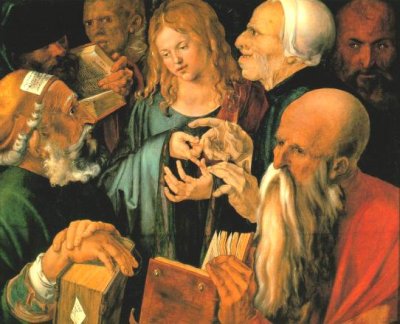Luke 2:40-52
Lesson 107
Lesson 107
Read both the "King James Bible" and the "New Living Translation."
In this lesson:
Twelve-year-old Jesus visits the Temple.
Luke is the only Gospel that tells the story of lost Jesus.
Since Luke never met Jesus, Bible scholars believe he heard the story from Mary.
Twelve-year-old Jesus visits the Temple.
Luke is the only Gospel that tells the story of lost Jesus.
Since Luke never met Jesus, Bible scholars believe he heard the story from Mary.
Young Jesus and the doctors of the Mosaic Law.
Study Tip:
Repetition is an old tool many writers use to emphasize key points. Whenever you see themes repeated in the Bible, this is a clue that God considers them important. Hover over these passages a little longer to fully grasp their meaning.
Repetition is an old tool many writers use to emphasize key points. Whenever you see themes repeated in the Bible, this is a clue that God considers them important. Hover over these passages a little longer to fully grasp their meaning.
Where was -
Jerusalem -
Hebrew for "foundation of Shalem" (peace). Jerusalem is also called Mount Zion, David's city, Ariel (Isaiah 29:1) or the Holy City. It is located fourteen miles west of the Dead Sea and thirty-three miles east of the Mediterranean and sits in the Judaean Mountains approximately 2,500 feet above sea level. Surrounded by valleys on three sides, Jerusalem dominated the area and in Jesus' time was the epicenter of Jewish life, government, and religion. The ancestral home of Israel's King David, ancient Egyptian texts mention the city going back to the 19th century BC. It is first mentioned in the Bible under the name Salem (Genesis 14:18) and is first called Jerusalem in Joshua 10:1. The original city covered only about eight acres but was continually being rebuilt and expanded. Many early Christians had to flee Jerusalem or face persecution. Through the centuries Jerusalem has been occupied by Assyria, Egypt, Babylon (2 Kings 25), Persia, Greece, and Rome (who destroyed the city and murdered its citizens in AD 70). Rome rebuilt the city, renamed it Colonia Aelia Capitolina, banned Jews, and constructed a temple to the pagan god Jupiter. In AD 614, the Persians captured the city and again Jerusalem's citizens were killed. The European Crusaders occupied Jerusalem in 1099 and later the Turks. Today, Jerusalem is the capital of Israel and holds religious significance for Jews, Christians, and Muslims.
Jerusalem -
Hebrew for "foundation of Shalem" (peace). Jerusalem is also called Mount Zion, David's city, Ariel (Isaiah 29:1) or the Holy City. It is located fourteen miles west of the Dead Sea and thirty-three miles east of the Mediterranean and sits in the Judaean Mountains approximately 2,500 feet above sea level. Surrounded by valleys on three sides, Jerusalem dominated the area and in Jesus' time was the epicenter of Jewish life, government, and religion. The ancestral home of Israel's King David, ancient Egyptian texts mention the city going back to the 19th century BC. It is first mentioned in the Bible under the name Salem (Genesis 14:18) and is first called Jerusalem in Joshua 10:1. The original city covered only about eight acres but was continually being rebuilt and expanded. Many early Christians had to flee Jerusalem or face persecution. Through the centuries Jerusalem has been occupied by Assyria, Egypt, Babylon (2 Kings 25), Persia, Greece, and Rome (who destroyed the city and murdered its citizens in AD 70). Rome rebuilt the city, renamed it Colonia Aelia Capitolina, banned Jews, and constructed a temple to the pagan god Jupiter. In AD 614, the Persians captured the city and again Jerusalem's citizens were killed. The European Crusaders occupied Jerusalem in 1099 and later the Turks. Today, Jerusalem is the capital of Israel and holds religious significance for Jews, Christians, and Muslims.





